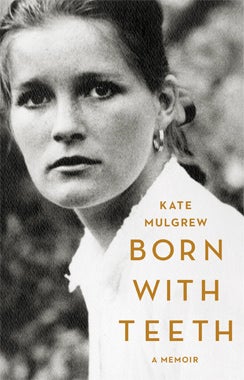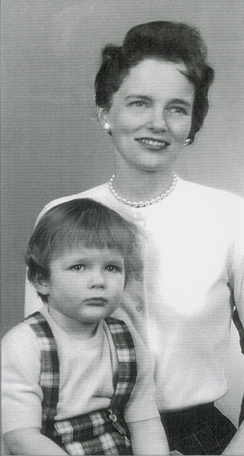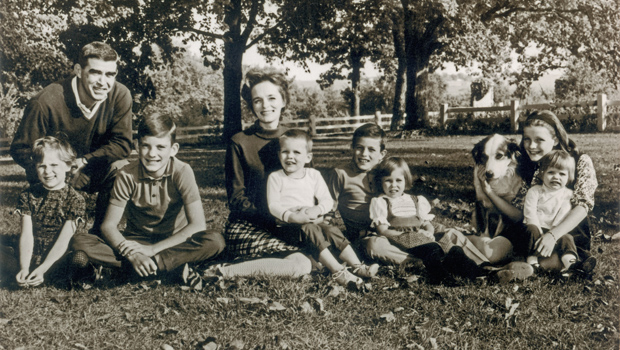Excerpt: "Born With Teeth" by Kate Mulgrew
Actress Kate Mulgrew exhibits an Irish talent for storytelling in her new memoir, "Born With Teeth" (Little, Brown). In it, she regales the reader with tales of her large Irish family (including the childhood deaths of two siblings), her TV and film career (her credits include "Ryan's Hope," "Cheers," "Star Trek: Voyager" and "Orange Is the New Black"), and her quest to find the daughter she once gave up for adoption.
In the excerpt below, Mulgrew writes of her parents, who knew how to drink, dance, talk and "stir up the devil"
I started out in a green house with a red door in a small town, where mysteries abounded. Immediately after issuing me into the world, my mother took me to this house and put me in a shoebox, which she placed on the dining room table so that one and all might come and gaze upon my perfect miniature beauty. Hands like starfish, to hear her tell it, grave but ravishing cornflower-blue eyes, and, most remarkable of all, a set of baby teeth. Two pearls on top and two, nonpareil, on the bottom. Shakespeare, my mother said, would have a field day. The neighborhood ladies were not impressed and stood there in silent judgment with arms crossed over pregnant stomachs. It wasn't good form to crow about your child's beauty, especially considering the vast numbers of children that populated those Irish-German households. My mother, however, was undaunted and maintained her frantic vigil until she convinced herself that I, her first daughter, was growing even tinier than I had been at birth. Alarmed, she rushed me to the hospital and demanded that I be incubated. Dr. Sharp, her obstetrician, shook his head but to no avail. And so it was that in that strange aquarium of light and warmth, my mother's face pressed against the glass, I developed a constitution that could only ever be described as able and hardy.
My father observed my growing appetite for solid food with ill-concealed contempt. "Jesus. H. Christ," he would mutter as I shoved yet another fistful of banana pudding into my mouth, "I'm going to the Lux Club for a belt." Of course, the Lux Club at happy hour was thick with young Catholic fathers looking for a quick reprieve before heading home to their harried wives and hordes of screaming children. These strapping Irish boys would then stumble home to find the madhouse magically transformed into an oasis of quiet, children tucked in, dishes done, the lovely young wife lying achingly still in the bed. He might whisper "Shhh" if she started to turn and then, oh so quickly, the nightgown was up over her thighs and the deed was done in a lightning flash so that neither he nor she could ever remember with nostalgia the actual moment in which any of their children was conceived.
My father was not surprised when Dr. Sharp visited and announced that I would need a special crib, one with bars on all sides as well as over the top because would you believe it, said the good doctor, but this kid has no sense of pain. Mother was delighted by the novelty of this condition and stood stoically by as my baby teeth were pulled, quickly and without incident, so as to prevent my eating them. I was too young to wink with intention, but I like to think I caught my father's eye as he pulled on his overcoat and invoked yet again the name of his secret friend, Jesus. H. Christ.
Babies appeared with maddening regularity. The bassinette, to my horror, was constantly emptied of one baby and filled with another. This was a sleight of hand I simply could not grasp, and yet I was told sternly that this was my younger brother Joe and to always rely on my older brother Tom and to hold this newest one gently and quietly because she was just an infant and her name was Maggie. I was given a bottle and told to feed this baby while the other kids went streaking out the front door to the Old Lot across the street, where all the neighborhood children were at play. Screams of pleasure and abandon pierced the living room where I sat in an armchair holding my baby sister, who seemed to me quite leaden, swathed, as she was, in thick cotton blankets. My resentment blossomed into rage when it dawned on me that I was not to be allowed my freedom that afternoon, that I was, in fact, being held prisoner by this lump of obligation called a sister and that not only had my siblings abandoned me but my mother had as well.
With growing fury, I rose and carried the baby into the kitchen, where I placed her on the countertop. I then took the bottle, unscrewed the lid, and poured the milk into the sink. At four years of age, I was sturdy and capable, or so my mother clearly thought, besetting me with duties far beyond my ken. My mother would pay for this injustice, and she would come to appreciate that I not only needed but deserved to play with the other kids, at dusk, in the Old Lot. With hatred and precision I turned the faucet on, and when the water ran cold, I filled the bottle up. I gathered Maggie and the bottle in my arms and trudged back to the armchair where, without hesitation, I fed my little sister the bottle of ice-cold water that would kill her.
When my mother at last came home and retrieved her baby, I struggled to tell her that it was I who had dealt the deathblow, which was why Maggie now lay in her crib silent and inert. I desperately wanted to confess to this homicide and clear my conscience, but my mother would have none of it and shooed me out the door to join my friends in what was left of the day's play.
The next morning, I crept into the nursery and on tiptoe peered closely at my sister. Maggie gazed at me with mild eyes and gurgled as only very sentient babies do. At that moment, I heard peals of laughter emanating from the basement and raced out of the room and down the stairs. The sound of my mother's laughter was the sound I lived for because it was absolute and good. I found her doubled over, clutching her sides, tears streaming down her cheeks as she pointed helplessly at the walls. Months before, my mother had painted the walls of the basement with murals depicting popular fairy tales and nursery rhymes: "The Three Little Pigs," "Little Red Riding Hood," "Mary Had a Little Lamb," "Jack and the Beanstalk," and, of course, "Sleeping Beauty." The murals were very clever because my mother had been an artist before she had married my father and become an indentured servant, however glorified.
"Look, Kitten, look!" she cried, pulling me by the hand until I was just inches from the Three Little Pigs. Only then did I realize that a P‑51 Mustang bomber had been painted to indicate the imminent annihilation of not only the Three Little Pigs, but when I looked to the opposite wall I saw that Little Red Riding Hood had a missile suspended directly over her head and that Jack was clinging with particular fervor to the beanstalk as bomber after bomber dove from beneath my mother's fluffy clouds, threatening to destroy the idyllic landscape. Some wicked-looking soldiers had been painted peering out from behind a barn, one of whom, wearing a helmet, held a rifle to the little lamb's head, and yet another leered at Little Red Riding Hood, all of which seemed to delight my mother and kept her, as she herself would say, in veritable stitches.
When my father came home after his daily nip at the Lux Club, my mother gave him the cold shoulder and said, "Boy, are you in trouble." He grinned sheepishly, which I thought an inappropriate response to my mother's obvious displeasure. We were put to bed early that night, but when I was sure my brothers and sister were fast asleep I stole out of my little bed and worked my way stealthily down the stairs. I discovered my parents in the basement, their shapes only partly visible in the dimly lit room, but it was clear that they were holding on to each other and that their faces were very close together and that my father was grinning, and my mother was laughing until suddenly, and for no reason at all, they pressed their faces together and stayed like that for a long, long time.
Desire and disillusion created the chiaroscuro of my parents' early marriage. Just a year earlier my mother had danced with Jack Kennedy at the Inaugural Ball and, despite her advanced pregnancy, the president had pulled her close and, smiling, whispered in her ear, "You missed your chance, Jik." But Catholic girls from good families don't miss chances; they dodge bullets and slowly relinquish their dreams. They go to Mass and wait for a miracle and aren't terribly surprised when it arrives in the shape of a handsome young man with modest ambition, dry wit, and honorable intentions. In gratitude for this miracle, the young woman will curb her passions with a sharp discipline, she will pack her bags with nothing of the trousseau she had been promised, she will leave a world of fortune and entitlement, and she will travel a very long way to a remote city in Iowa where she will be met at the train by her mother-in-law, an elegant woman dressed in a chartreuse silk suit, who will extend her hand and say, "I would prefer it if you called me Mrs. Mulgrew."
In Dubuque, Iowa, the green house with the red door was unconventional. Inside lived a woman who came from the East, a striking young woman with auburn hair, freckles, and a ready laugh, who was often seen in the company of her very good-looking and charming husband, and though they were christened Joan Virginia and Thomas James, they were known as Jiki and Ace, and they knew how to drink, how to dance, how to talk, and how to stir up the devil.
My father, intense and tightly wound, was a presence strongly felt. He wanted things to happen, and he desperately wanted things to happen that would please his prize of a wife. Above all, he wanted her to love him. He opened the front door at 7:00 p.m. one Friday night to find all four of us children stark naked and screaming with delight as we jumped, one by one, down the laundry chute, bottoms splintered and foreheads bruised as we crash-landed onto an ever-growing pile of dirty clothes. In the adjoining room, he watched quietly as my mother mixed her paints and regarded her canvas with complete concentration, oblivious to the chaos surrounding her. "How about a drink, Jik?" he asked and she turned, slightly exasperated, and said, "Sounds like heaven."
We were left with the neighbor girl then, Kathleen McGrane, a formidable creature who came from a family of giants. Everyone knows that giants enjoy tormenting Lilliputians, but my parents were deaf to our pleas as they bundled themselves into heavy coats and drove away, not once looking back. They drove far into the countryside on a frostbitten winter's night until they found an isolated tavern, a neon sign beckoning in the darkness. The door swung open, and the place greeted them in silence, these good-looking, high-spirited travelers from town. These people were country folk, and they didn't like anything too fancy, too smart, or too different. My parents were decidedly different, and this was instantly acknowledged when my mother, instead of sliding properly into a booth, slipped onto a barstool and, turning to the fellow next to her, said, "What are you drinking to cut the ice?" The fellow at first blushed, then, startled by his own insecurity, grew suddenly bold and ordered the bartender to get the "little lady" a drink, which she immediately accepted, and when she raised her glass to clink with his, the man threw back his head and laughed. In very short order, there were many drinks and many clinks and the jukebox lit up and the countryman wanted my mother to dance and so she did but she didn't like his style, which was rough and overreaching, and that was when she called out for my father to save her, but when my father, laughing, intervened, the rough man turned purple and, before there was even a second's grace, fists were flying, chairs were overturned, and it was a real down and dirty, place-your-bets bar fight. My father was the victor and my little mother, cheeks blazing and blood racing, bundled him into the car and took the wheel, peeling out of that parking lot like there was no tomorrow.
Once home, my mother ministered to my father's wounds, medication in the form of many whiskeys was taken and so too, in the end, was the nurse, who found my father's black eye and bloody nose absolutely irresistible.
On a Sunday morning two weeks later, the house was curiously still. My father lay in bed much later than usual. I was in the kitchen doing what I did best, foraging for food. The boys were outside raising hell and my mother seemed to be hiding. I did not find her in the basement, at her painting, or in the backyard at the clothesline or in the living room, reading her book. I slowly climbed the stairs to the second floor, thinking I might discover her stealing a quiet moment for a bath, but the bathroom was empty. Suddenly, I heard a soft noise, one with which I was unfamiliar but that nonetheless sent a chill through me and made me stand very, very still, as if frozen in place. From where I stood, I could see into my parents' bedroom, and in the half-light I could make out my mother's form, bending over Maggie's crib. But my mother was not touching the baby; instead she had one hand over her mouth and the other extended above her, as if reaching for someone. I heard a mangled groan and saw my father as he approached my mother, who suddenly turned and looked at him as if she didn't know him, frantically waving her arm at him as if warning him to stay away. That's when I saw the most confusing thing of all: my father stepped quickly to my mother and, pinning her arms to her sides, turned her away from the crib and, bending down, put his free hand on my little sister's neck. His head dropped for a moment, and then he straightened, gathered my mother in his arms, and carried her out of the room.
Maggie disappeared from the house and we were told nothing. Little children could not grasp the notion of death. Nevertheless, at the age of four I felt my mother's growing distance and I became her constant shadow, sometimes even demanding that she put me in her lap, and so she would, whereupon I would take her hand and place it deliberately over my own so that I could play with her slender wristwatch and imagine that I was, if only for a moment, in charge of my mother's happiness. The crib was removed from the master bedroom, and all of Maggie's clothing was stored in a bin, which my father sealed and put away in the attic. A week later, he came across my mother in the laundry room, where she had long ago organized individual cubbies in which to place each child's clothes. Each cubby had a name colorfully painted on it, to identify the owner. My father watched as my mother, leaning over a bin, extracted one article of clothing after another, which she carefully folded and refolded and then placed in the cubby painted with the name Maggie.
She looked at him, smiled, and went back to her work. Some weeks later, my father and my grandmother decided to send my mother on a cruise. My father bought my mother new dresses and a new coat, not only to accommodate her fifth pregnancy but because she had become so thin, having subsisted for weeks on a diet of cigarettes and coffee. I can't remember whether she kissed me good-bye or not, but it didn't matter because I knew I would be spending many days alone in my room, watching the other kids playing in the Old Lot, secure in the knowledge that it was I, and I alone, who had killed my sister Maggie that fateful day when I had forced the ice water into her lungs.
I had tried to tell my mother, but she wouldn't listen. And now it was too late.
Excerpt from the book "Born With Teeth: A Memoir" by Kate Mulgrew. Copyright © 2015 by Kate Mulgrew. Reprinted with permission of Little, Brown and Company.
For more info:
- "Born With Teeth: A Memoir" by Kate Mulgrew (Little, Brown); Also available in eBook, Hardcover Large Print, Audio CD and Audio Download formats
- Follow @TheKateMulgrew on Twitter


